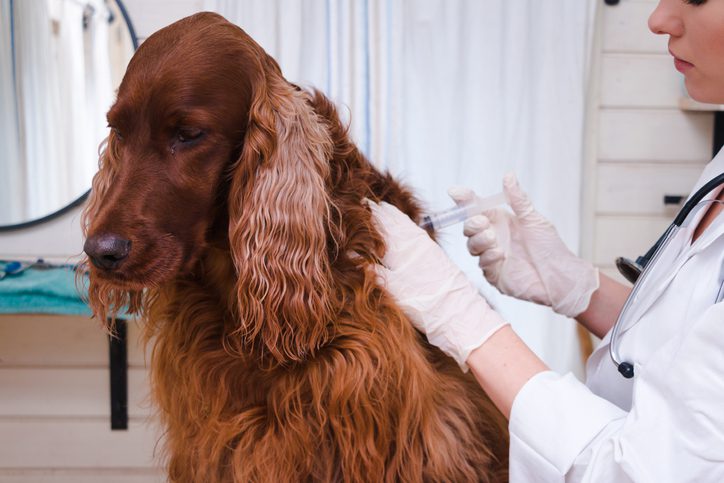Why is the Dog Rabies Vaccine Important in Wilton Manors, FL?
Rabies is a fatal disease that can be acquired through the bite of an infected animal. It affects not only dogs but also other pets and humans. It is an insidious, nasty virus that does not discriminate when choosing a victim.
You must be sure that your dog gets their rabies vaccine. It protects them against developing the virus, which protects them from having to be put down. There is no medication for the virus, but your vet may be able to give your dog a booster shot if they have been exposed.
It is the law that your pup receives their required vaccinations. If you want to learn why the dog rabies vaccine is essential, peruse this article.
What is Rabies?
Rabies is a deadly virus transmitted from the saliva of infected animals to pets or people. It is usually spread when the animal bites the pet or human. In most cases, animals that carry the rabies virus include foxes, bats, coyotes, raccoons, and skunks. In exceptional cases, rabies can occur when the infected saliva gets into the mouth, eyes, or open wound. This viral illness poisons the central nervous system of mammals. Eventually, this disease travels to the brain and causes death. Rabies is passed chiefly throughout the wild animal community; however, any mammal can contract this disease.
In the United States, it is rare for dogs to give rabies to humans. However, in developing countries, rabies is often transmitted through the bite of a stray dog. Rabies causes inflammation of the brain and spinal cord in animals and humans. Once symptoms appear, the result is almost always death. The great news is that the infection is avoidable with the rabies vaccine.
Who Should Be Vaccinated for Rabies and How Often?
Canines are not the only animals that can be affected by rabies. All warm-blooded mammals with fur can contract rabies. It is required by law that all domestic pets, like dogs, cats, and ferrets, receive their rabies vaccines. The following is an average example:
- Dogs should be vaccinated at 14 to 16 weeks old and again at age one. Then again, every one or three years after that depending on the longevity of the vaccine given.
- Cats should be vaccinated at 14 to 16 weeks old and again at age 1. Then again, every one or three years after that depending on the longevity of the vaccine given.
- Ferrets should be vaccinated at 14 to weeks old and every three years after that
Even if your cat never goes outside, and they are indoor-only house cats, they still need to be vaccinated for rabies. Every state has different laws about how often your pet should be vaccinated. Click on the link to find out the vaccination laws in your state.

What Are Symptoms of Rabies in Dogs?
Rabies disturbs a dog’s central nervous system. It can cause dangerous physical and behavioral issues because the central nervous system is involved there will be an incidence of staggering, seizures, and paralysis. These are not the only symptoms; there are also:
- Restlessness
- Irritability
- Aggression
- Fever
- Difficulty swallowing
- Excessive drooling or foaming at the mouth
The virus can be in the dog’s system for weeks before they begin to show signs of infection. Once an animal displays symptoms of rabies, it almost always results in death. If a wild animal ever bites your dog, get them to the vet immediately. If a wild animal has bitten your pup, your vet can give them a booster of the rabies vaccination to decrease the chance that they will develop the virus.
Why is the Rabies Vaccination a Success?
The rabies vaccine has saved billions of pets in the United States from contracting rabies. Many states have rules that indicate that if an animal has rabies, they are to be put down because rabies can harm other animals and people, and it is a fatal disease. Rabies kills 59,000 people every year, primarily due to contact with unvaccinated dogs in other countries where it is not required by law.
According to the Center for Disease Control, before 1960, most rabies cases were predominantly seen in domesticated animals. Today, most rabies cases are only seen in wildlife, not pets, which is a remarkable success! Our pets are protected when the rabies vaccine is administered and their shots are up to date.
Are There Special Conditions Involved with Vaccinations?
When a dog comes into adulthood, there may be special conditions concerning how the vet wants to manage the pup’s vaccination schedule, regardless of state requirements. This schedule means that it can depend on certain factors:
- Your dog’s lifestyle
- The dog’s vaccination history
- The vaccine manufacturer’s recommendations

Are Dog Vaccines Safe?
Dog vaccines are absolutely safe. The benefit of vaccinations far outweighs even the slightest chance that your dog may have a reaction to it. Think of it this way: when you vaccinate your dog, you are not only saving your dog’s life, but you are also saving any animal or person that comes in contact with your dog. The biggest and most important motivator should be that your pup will not be put down in a situation that would have been avoidable in the first place. Rabies is an avoidable tragedy, and all you need to do is have your dog vaccinated.
There may be some possible mild side effects after vaccination:
- Swelling at the injection site
- Mild fever
- Decreased appetite
- Lack of energy
- Sneezing
- Mild coughing
These side effects are only temporary. They will typically only last for a day or a couple of days after receiving their vaccine. There are infrequent risks of an allergic reaction to having the vaccine. However, it is so rare that cases are hardly ever reported. The reason rabies is so rare now is due to our successful and consistent rabies vaccination program. Rabies is tremendously rare in nations that are developed. There is no justification not to have your pet vaccinated. As pet parents, much of our responsibility involves keeping them safe, and vaccines are a significant part of the equation.
Conclusion
Rabies is a frightening disease transmitted through the bite of an infected animal. Rabies vaccines are required by law since acquiring rabies almost always results in a fatality. You want to be a conscientious pet parent and get your fur baby all the shots they require to keep them safe and healthy. Ensuring your dog gets their rabies vaccine is the best way to protect them against dire and tragic consequences.
If you have any questions about your pet or anything in regards to the rabies vaccine, please schedule an appointment with us or call Arbor Pet Hospital at (954) 565-1896.
Recent Posts
About Us
At Arbor Pet Hospital, pets and their people have been at the heart of what we do since 1962. We’re proud to be one of the longest-standing animal hospitals in Greater Fort Lauderdale, providing trusted, full-service care for cats and dogs in Wilton Manors and beyond.
